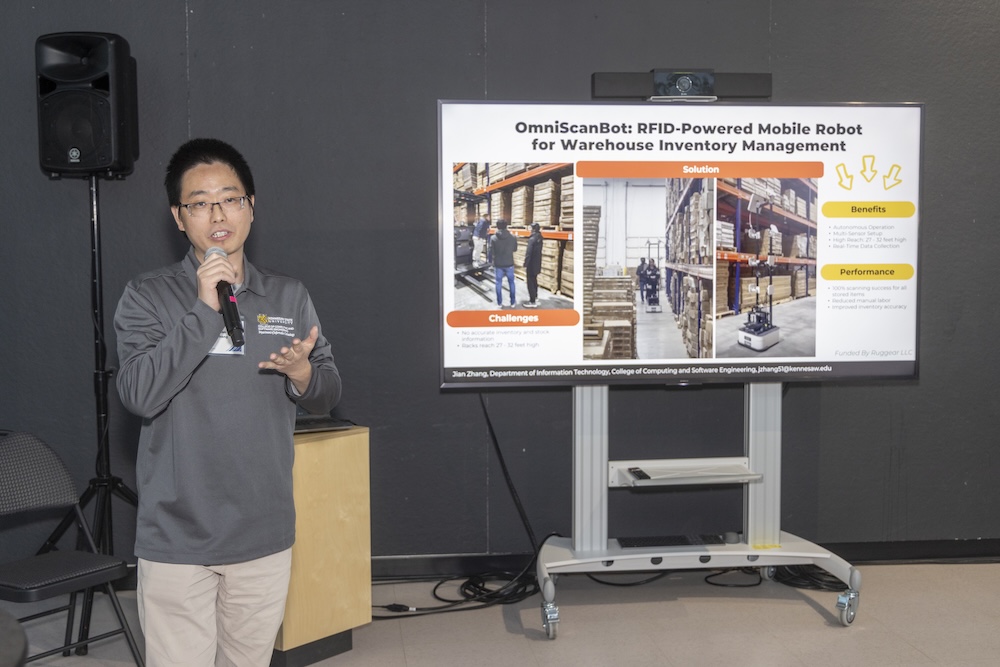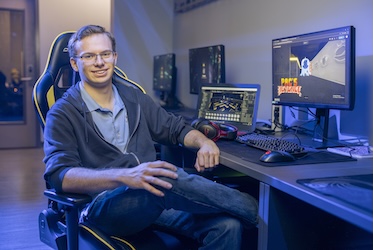
Kennesaw State researcher tackles inventory issues with autonomous warehouse robot
KENNESAW, Ga. | Apr 28, 2025

Developed in collaboration with RugGear USA LLC and KSU’s College of Computing and Software Engineering, the OmniScanBot is an autonomous robot designed to simplify, speed up, and safeguard the process of warehouse inventory tracking. Unlike manual counting methods, Zhang’s innovation harnesses radio frequency identification (RFID) technology to automate the entire process.
Zhang's motivation for developing the robot stemmed directly from the needs of industry partners. Ruggear USA supported Zhang not only with funding, but also with access to one kitchen cabinet warehouse in Duluth, Georgia and equipment, often providing feedback on the product’s development.
The goal was to design a cost-effective robot that could navigate industrial warehouses – some as large as 100,000 square feet and with inventory stacked up to 32 feet high – and scan everything efficiently and autonomously.
“We wanted to build something that didn’t require a person to operate it,” Zhang said. “It should move and scan by itself. However, the biggest challenge was the environment—navigating tall shelves, changing layouts, and avoiding people and forklifts.”
Traditionally, warehouses of small business at Atlanta perform inventory checks once a year using special forklifts and manual labor. However, Zhang said this method is inefficient, inaccurate, and prone to costly errors. Zhang illustrated this issue with an anecdote of a company that shipped a cabinet to the wrong warehouse but didn’t notice the mistake until eight months later.
OmniScanBot was designed to prevent such issues. Built on a multi-sensor platform, it includes cameras, LiDAR, and navigation software that enables it to create a map of the warehouse and autonomously plan its route.
The robot’s main feature is its ability to scan RFID tags on box-level inventory without needing a direct line of sight, making it much more accurate than barcode scanning or manual counts.
Based in the College of Computing and Software Engineering, Zhang and his team specialize in intelligent systems and automation, expertise that proved essential in quickly turning the concept into a functional, real-world solution. The team developed the prototype in just four months.
“The speed was possible because we’ve been working in robotics for a long time,” he said. “But every new environment still presents challenges, changing layouts, obstacles, and moving people or equipment. The robot must adjust constantly.”
The OmniScanBot project also serves as yet another example of how academic research can drive industry innovation, CCSE Dean Sumanth Yenduri added.
“Innovative projects like OmniScanBot exemplify the real-world impact our faculty are making through applied research,” Yenduri said. “Dr. Zhang’s work not only advances warehouse automation but also reinforces our commitment to solving industry challenges with practical, scalable technology.”
While the OmniScanBot prepares for market, Zhang is most proud of the impact it’s already having.
“Seeing the smiles on the faces of warehouse workers is the most rewarding part for me,” he said. “Nobody likes doing inventory. It’s boring and exhausting. But with OmniScanBot, we’re giving people their time and peace of mind back.”
– Story by Raynard Churchwell
Photos by Darnell Wilburn
Related Stories

Kennesaw State to revive bathtub race tradition with new video game

Kennesaw State student develops AI tools to help first responders diagnose behavioral health issues

Kennesaw State computer game design student launches studio, first video game

Kennesaw State student integrates artificial intelligence into architectural design education
A leader in innovative teaching and learning, Kennesaw State University offers undergraduate, graduate, and doctoral degrees to its more than 47,000 students. Kennesaw State is a member of the University System of Georgia with 11 academic colleges. The university’s vibrant campus culture, diverse population, strong global ties, and entrepreneurial spirit draw students from throughout the country and the world. Kennesaw State is a Carnegie-designated doctoral research institution (R2), placing it among an elite group of only 8 percent of U.S. colleges and universities with an R1 or R2 status. For more information, visit kennesaw.edu.














